Obama Libya Speech Post-Mortem
Ten days after sending American forces into kinetic military action in Libya, President Obama addressed the nation to explain "what we've done, what we plan to do, and why this matters to us."
Ten days after sending American forces into kinetic military action in Libya, President Obama addressed the nation to explain “what we’ve done, what we plan to do, and why this matters to us.” Not surprisingly, he didn’t tell me anything I didn’t already know or change my mind. But I wasn’t the target audience; most listeners haven’t spent the last two decades thinking about armed intervention.
Obama set the stage for his remarks by reminding people of the events leading up to the war.
For generations, the United States of America has played a unique role as an anchor of global security and as an advocate for human freedom. Mindful of the risks and costs of military action, we are naturally reluctant to use force to solve the world’s many challenges. But when our interests and values are at stake, we have a responsibility to act. That’s what happened in Libya over the course of these last six weeks.
Libya sits directly between Tunisia and Egypt — two nations that inspired the world when their people rose up to take control of their own destiny. For more than four decades, the Libyan people have been ruled by a tyrant — Muammar Gaddafi. He has denied his people freedom, exploited their wealth, murdered opponents at home and abroad, and terrorized innocent people around the world — including Americans who were killed by Libyan agents.
In the face of the world’s condemnation, Gaddafi chose to escalate his attacks, launching a military campaign against the Libyan people. Innocent people were targeted for killing. Hospitals and ambulances were attacked. Journalists were arrested, sexually assaulted, and killed. Supplies of food and fuel were choked off. Water for hundreds of thousands of people in Misurata was shut off. Cities and towns were shelled, mosques were destroyed, and apartment buildings reduced to rubble. Military jets and helicopter gunships were unleashed upon people who had no means to defend themselves against assaults from the air.
While horrendous, these actions were hardly unprecedented. Other leaders in the Middle East and Africa are doing much the same without international military intervention. Then again, none was forthcoming in Libya, either, at that point in the sequence.
Ten days ago, having tried to end the violence without using force, the international community offered Gaddafi a final chance to stop his campaign of killing, or face the consequences. Rather than stand down, his forces continued their advance, bearing down on the city of Benghazi, home to nearly 700,000 men, women and children who sought their freedom from fear.
At this point, the United States and the world faced a choice. Gaddafi declared he would show “no mercy” to his own people. He compared them to rats, and threatened to go door to door to inflict punishment. In the past, we have seen him hang civilians in the streets, and kill over a thousand people in a single day. Now we saw regime forces on the outskirts of the city. We knew that if we wanted — if we waited one more day, Benghazi, a city nearly the size of Charlotte, could suffer a massacre that would have reverberated across the region and stained the conscience of the world.
It was not in our national interest to let that happen. I refused to let that happen. And so nine days ago, after consulting the bipartisan leadership of Congress, I authorized military action to stop the killing and enforce U.N. Security Council Resolution 1973.
Obama has mentioned the “no mercy” line numerous times; it was clearly the final straw for him. And, clearly, the fact that international support–including that of the Arab League–for action was coalescing is an important distinction, for Obama at least, between Libya and other places, such as Ivory Coast and Bahrain, where unspeakable violence is being perpetrated by governments. The fact of UNSCR 1971 as justification, however, is rather hollow given that the United States has a veto power in the Security Council.
In just one month, the United States has worked with our international partners to mobilize a broad coalition, secure an international mandate to protect civilians, stop an advancing army, prevent a massacre, and establish a no-fly zone with our allies and partners. To lend some perspective on how rapidly this military and diplomatic response came together, when people were being brutalized in Bosnia in the 1990s, it took the international community more than a year to intervene with air power to protect civilians. It took us 31 days.
Moreover, we’ve accomplished these objectives consistent with the pledge that I made to the American people at the outset of our military operations. I said that America’s role would be limited; that we would not put ground troops into Libya; that we would focus our unique capabilities on the front end of the operation and that we would transfer responsibility to our allies and partners. Tonight, we are fulfilling that pledge.
The president then noted that NATO, which he rightly called “Our most effective alliance,” is about to assume control. That, as Damon Wilson and James Carafano, national security experts at the Atlantic Council and the Heritage Foundation, respectively, have noted, that there is no NATO without the United States, was left unsaid. But, he acknowledged, destroying Gaddafi’s air power and stopping major atrocities does not end the mission. Not by a long shot.
That’s not to say that our work is complete. In addition to our NATO responsibilities, we will work with the international community to provide assistance to the people of Libya, who need food for the hungry and medical care for the wounded. We will safeguard the more than $33 billion that was frozen from the Gaddafi regime so that it’s available to rebuild Libya. After all, the money doesn’t belong to Gaddafi or to us — it belongs to the Libyan people. And we’ll make sure they receive it.
[…]
Now, despite the success of our efforts over the past week, I know that some Americans continue to have questions about our efforts in Libya. Gaddafi has not yet stepped down from power, and until he does, Libya will remain dangerous. Moreover, even after Gaddafi does leave power, 40 years of tyranny has left Libya fractured and without strong civil institutions. The transition to a legitimate government that is responsive to the Libyan people will be a difficult task. And while the United States will do our part to help, it will be a task for the international community and — more importantly — a task for the Libyan people themselves.
[…]
As the bulk of our military effort ratchets down, what we can do — and will do — is support the aspirations of the Libyan people. We have intervened to stop a massacre, and we will work with our allies and partners to maintain the safety of civilians. We will deny the regime arms, cut off its supplies of cash, assist the opposition, and work with other nations to hasten the day when Qaddafi leaves power. It may not happen overnight, as a badly weakened Gaddafi tries desperately to hang on to power. But it should be clear to those around Gaddafi, and to every Libyan, that history is not on Gaddafi’s side. With the time and space that we have provided for the Libyan people, they will be able to determine their own destiny, and that is how it should be.
The president then turned to his critics, both those who think the United States did too little and those who think we did too much and explained why the chosen course was just right:
America has an important strategic interest in preventing Gaddafi from overrunning those who oppose him. A massacre would have driven thousands of additional refugees across Libya’s borders, putting enormous strains on the peaceful — yet fragile — transitions in Egypt and Tunisia. The democratic impulses that are dawning across the region would be eclipsed by the darkest form of dictatorship, as repressive leaders concluded that violence is the best strategy to cling to power. The writ of the United Nations Security Council would have been shown to be little more than empty words, crippling that institution’s future credibility to uphold global peace and security. So while I will never minimize the costs involved in military action, I am convinced that a failure to act in Libya would have carried a far greater price for America.
Now, just as there are those who have argued against intervention in Libya, there are others who have suggested that we broaden our military mission beyond the task of protecting the Libyan people, and do whatever it takes to bring down Gaddafi and usher in a new government.
Of course, there is no question that Libya — and the world — would be better off with Gaddafi out of power. I, along with many other world leaders, have embraced that goal, and will actively pursue it through non-military means. But broadening our military mission to include regime change would be a mistake.
The task that I assigned our forces — to protect the Libyan people from immediate danger, and to establish a no-fly zone — carries with it a U.N. mandate and international support. It’s also what the Libyan opposition asked us to do. If we tried to overthrow Gaddafi by force, our coalition would splinter. We would likely have to put U.S. troops on the ground to accomplish that mission, or risk killing many civilians from the air. The dangers faced by our men and women in uniform would be far greater. So would the costs and our share of the responsibility for what comes next.
I’m reminded by statements in the aftermath of the 1991 Gulf War by President George H.W. Bush and General H. Norman Schwarzkopf. But this is the price war by coalition: to get the legitimation that comes with far-flung support means setting war aims at the comfort level of the least enthusiastic ally. That’s a strange policy for the most capable member of the coalition to take but, again, the price of claiming international mandate.
Next, the president turned to what some are calling the “Obama Doctrine.”
Let me close by addressing what this action says about the use of America’s military power, and America’s broader leadership in the world, under my presidency.
As Commander-in-Chief, I have no greater responsibility than keeping this country safe. And no decision weighs on me more than when to deploy our men and women in uniform. I’ve made it clear that I will never hesitate to use our military swiftly, decisively, and unilaterally when necessary to defend our people, our homeland, our allies and our core interests. That’s why we’re going after al Qaeda wherever they seek a foothold. That is why we continue to fight in Afghanistan, even as we have ended our combat mission in Iraq and removed more than 100,000 troops from that country.
There will be times, though, when our safety is not directly threatened, but our interests and our values are. Sometimes, the course of history poses challenges that threaten our common humanity and our common security — responding to natural disasters, for example; or preventing genocide and keeping the peace; ensuring regional security, and maintaining the flow of commerce. These may not be America’s problems alone, but they are important to us. They’re problems worth solving. And in these circumstances, we know that the United States, as the world’s most powerful nation, will often be called upon to help.
In such cases, we should not be afraid to act — but the burden of action should not be America’s alone. As we have in Libya, our task is instead to mobilize the international community for collective action. Because contrary to the claims of some, American leadership is not simply a matter of going it alone and bearing all of the burden ourselves. Real leadership creates the conditions and coalitions for others to step up as well; to work with allies and partners so that they bear their share of the burden and pay their share of the costs; and to see that the principles of justice and human dignity are upheld by all.
Steven Metz, a strategist at the Army War College–who last week predicted the likelihood of a full-blown insurgency in Libya–notes that Obama is clearly trying to draw a firm distinction between his worldview and that of his predecessor. Whereas George W. Bush was a “big idea” president, whose foreign policy was driven by ideology, Obama’s “instincts have been more those of a lawyer, charting a careful course through specific challenges and gravitating to a middle path which minimized risk. It has been serial problem-solving rather than big ideas.” Additionally, while the Bush administration assumed that absent “vigorous U.S. action, violent extremism would grow in power and the United States would face mounting danger,” the current team believes “the United States does not need to re-engineer the world, but only to prod, channel, and support transformation that is already underway.”
Ironically, then Metz was actually reminded of former Bush SECDEF Donald Rumsfeld: “Drawing lessons from the Balkan conflict of the 1990s, Rumsfeld believed that if the United States minimized its role in the stabilization and reconstruction of Iraq, other nations would step up. Only when they did not was the United States forced to shoulder the burden.”
Georgetown’s Dan Nexon, meanwhile, is “tired of demands for an articulated ‘Obama Doctrine.'” While “it would be nice if the Obama Administration had an overarching vision for US foreign policy” and “could produce something resembling a coherent document on the subject instead of the stream-of-consciousness bureaucratic filler it tends to publish,” Nexon “emphatically rejects the idea that Obama ought to, in effect, retcon Libya by articulating an ex post facto grand strategy that makes sense of his decision to intervene.”
His assessment of the rationale offered in the speech is that Obama articulated a “Humanitarian-intervention-against-militarily-weak-fossil-fuel-producing-countries-in-strategically-important-regions-that-are-also-located-near-many-large-NATO-military-bases-and-are-run-by-dictators-who-kind-of-piss-us-off-and-have-no-powerful-allies Doctrine.” And while that’s neither a Grand Strategy nor a useful signpost for future decisionmaking, Nexon is fine with that. Each circumstance is ultimately sui generis. He links approvingly to McGill’s Steve Saideman, who advocates discrimination in international relations, arguing that rational leaders “do not follow principled foreign policies that require them to follow a particular course of action when a particular circumstance arises. Instead, they weigh their interests, confront varying domestic pressures and stumble along.”
While I draw the line for war at a different point than Obama, Nexon and Saideman are right: absent an existential threat like nuclear Armageddon at the hands of a fellow superpower, American foreign policy will naturally be ad hoc. An, in principle, George Washington’s Marc Lynch is right, too, when he says “The fact that Cote d’Ivoire is awful is a terrible reason to oppose intervening to save Libyans from slaughter in Benghazi.”
For understandable reasons, democratic leaders tend to highlight the most lofty reasons for war. In reality, however, the decision to use military power takes into account a lot of less savory considerations as well, including domestic politics, the views of critical regimes in the region–themselves often little better than the people we’re fighting, and the relative ease and cost of success. That’s messy and unsatisfying. But it’s the nature of international politics.
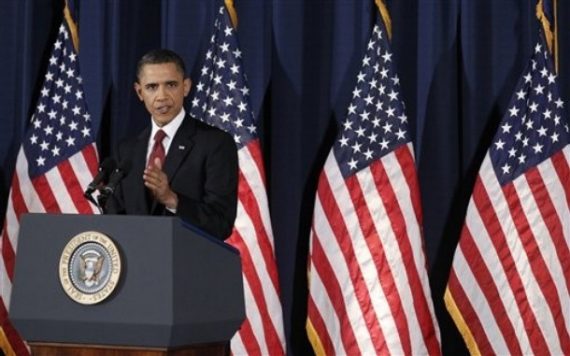

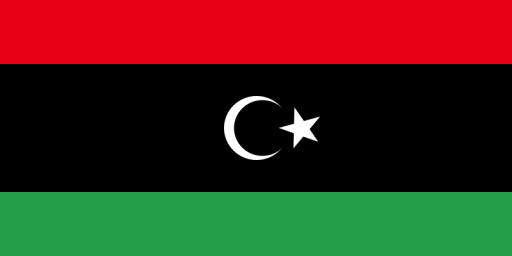
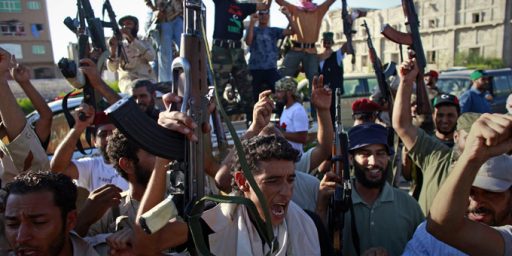
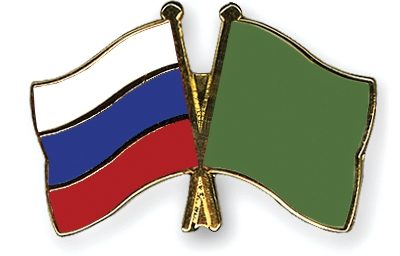

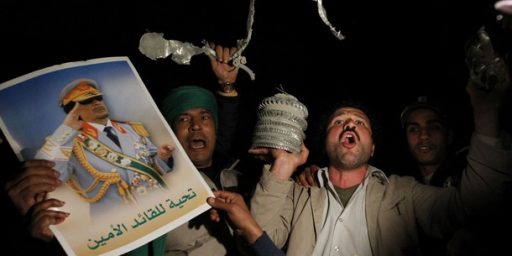
So, your view of UN votes is that since we can veto, who cares what they think?
And your view of NATO is that since it’s all us, who cares what they think?
… I don’t think that’s really how you hold together international alliances in the long run.
… in game theory it is critical to think of iterative cycles, rather than a one-time deal.
Thanks, James. It was nice to read a cogent analysis of a difficult situation by someone who actually knows what he’s talking about – so rare on the Internets.
But I think the key line may have come from Metz – ““the United States does not need to re-engineer the world, but only to prod, channel, and support transformation that is already underway.”
The Libya policy looks like another attempt to reset the relationship between the US and the Middle East in reference to Al Qaeda. The Bush policy produced more terrorists. Obama is trying to pull their fangs by proving that we are not what they say we are.
I’ve always thought that the neocon approach showed a idiot’s grasp of basic human psychology. The best way to get a horse to drink is to make it thirsty.
I don’t know Fog, maybe you are just trying to start off on a good foot there, but I couldn’t read this line as cogent:
Not at all. James ask us to believe that since we can veto our allies (allies in other ongoing conflicts) their opinions don’t matter.
@John Personna: Oh, I think the views of allies and the international community are important; they’re just shouldn’t be decisive in sending American troops to war–especially when, in reality, we’re providing the bulk of the fighting capacity. Further, two of the five Permanent Members of the UNSC–China and Russia–were against action but were persuaded to abstain. Germany, a rotating UNSC member and a key NATO partner, was against but was persuaded to abstain. And the Gulf states wanted us to do much less than we did. So, even if you think what others think is decisive, the signals were decidedly mixed.
@Fog: I prefer Obama’s adhocery to the National Greatness view of the neocons. But, to paraphrase Mr. Wolf, let’s not start fellating each other just yet. We still don’t know what the aftermath looks like for Libya or the region.
I would have been fine with our abstaining, but on the other hand I can see that we have an obligation to Brittan for their coming along on Iraq. Remember, they knew we were fixing the intelligence around the policy. They knew what was “sexed up.”
You throw the word “decisive” there like anything can be. I don’t think so. This is about forward iterations, probabilities in both European and North African relations.
I’d hope Obama knows this is a gamble, and isn’t going all-in. We’ll see, but I don’t see any “Obama Doctrine” up there. Maybe doctrine-seekers will find one no matter what.
This is our ad-hoc response to the European ad-hoc response to an ad-hoc revolution in Libya.
So it’s realpolitik all over again?
“We still don’t know what the aftermath looks like for Libya or the region.”
We never do, and never will. But that’s also no excuse for inaction. As my old Classics prof used to say, “The human tragedy is that we are forced to make decisions all the time without sufficient information.”
And to set the record straight, I’m actually a vicious prick, but I happened to like this post.
It’s almost as though we have never left the Truman Doctrine.
Steve
“I prefer Obama’s adhocery to the National Greatness view of the neocons.”
Is there much difference besides presentation?
The United States is exceptional and has exceptional responsibilities to the internal governance of other countries.
“So it’s realpolitik all over again?”
Sure. Though, when you say “all over again,” I was one who argued that Iraq in particular failed the realpolitik test. Afghanistan, as a quick in-and-out, would have won on that basis though.
> So it’s realpolitik all over again?
If you are referring to Iraq, there was not a whole lot of reality involved with the policy that led us to war. Only the consequences were real.
I can’t stay mad at the big guy after that speech.
Let’s just pick our Ahmed Chalabi from the carpetbaggin’ Libyans flocking home, turn it over to them and wrap this noble endeavor up.
I can’t stay mad at the big guy after that speech.
That has to be one of the dumbest things I’ve ever read here, and that includes wr’s frothings.
Let’s just pick our Ahmed Chalabi from the carpetbaggin’ Libyans flocking home, turn it over to them and wrap this noble endeavor up.
That is probably the best solution to this whole mess, and far more coherent than anything out of Obama or any of his minions. I think I could cheerfully get behind that decision.
OK, who edited ponce’s comment to put in that second sentence? ‘cuz I’m not buying that he said both things. It totally blows my stereotype of him.
J.
and with that, jay tea jumps the shark
CB, it was sarcasm. I know Ponce wouldn’t accept a direct compliment, so I made it a back-handed one because I believe that it would come across as more sincere.
Sorry it was too convoluted or complicated for you to grasp.
J.
I for one welcome our new Bush-Lite administration
James:
Excellent in every respect.
I am pleased that people recognize the wisdom of adaptation to circumstance — ad hoc — and the limited value — or even the danger — of grand unifying theories.
I’m glad that we seem, at least for this post on this blog, to have moved past the specious, sooner, later, more, less, follow, lead arguments.
I’ve had doubts about the policy from the start and judged it had a 60/40 likelihood of success. But Mr. Obama’s explanation is coherent and moral and pragmatic. (Though one sees a certain fluid evasion of things best left unsaid.) And the diplomatic execution, the stuff we don’t see in detail I believe and have from the start, will become the stuff of legend in international relations circles.
Can’t wait for the leaked cable in coming years.
Once again the right-wings attack on Obama is left in tatters. John McCain looked like a fool in the interview after the speech. The attempts by the GOP to paint Obama as weak or indecisive fail yet again.
Obama is a very frustrating guy for his supporters as well as his detractors. But people should start paying attention less to how he gets there and more to the fact that he usually ends up where he sets out to go.
Actually, I’m thinking Kissinger and Nixon.
The more I think about it, Nixon-Lite may be more appropriate than Bush-Lite.
lol…….
charles,
Care to explain? The two biggest pieces of Nixon’s foreign policy were his dealings with Viet Nam, and his opening of trade with China. I don’t quite see how either apply here, but perhaps you are going with a different angle. Please elaborate?
Mr. Huddleson, think more generally than specifically. It isn’t where so much as what and why that matter here, although, perhaps only Obama could go to Cairo, if you know what I mean and want to draw an allusion to Nixon opening China.
But otherwise, off the top of my head, how’s this?
Nixon inherited a war and escalated it before “declaring victory” and abandoning it. Obama’s got two out of three of those already with the War on Terror. We’ll have to wait and see if he as cynically cuts and runs for 2012 electoral reasons.
Well, if the neo-cons are anything they are idealogues. The Obama Doctrine, if that’s what it is, feels a lot closer to Kissinger’s realpolitik than any Bush Doctrine, however you want to define it.
Domestically, I see the various initiatives as misguided — and yet ominously closer — to achieving the practical effects of Nixon’s wage and price controls as anything before or since, but YMMV. The seeds of malaise were planted under Nixon and Ford and Carter did his damnedest to fertilize them and nurture them to fruition. I can see a parallel here with Bush and Obama.
Nixon’s administration had a real problem with honesty and transparency. See any similiarities there? Anyone?
Not really trying to start yet another thread pissing down each others’ leg contest, but you asked.
Mr. Hudleson, one too many d’s in your name. My apologies.
Don’t worry, I ignored the parts that i felt were unfair criticism (as i’m sure you do with my comments). Thanks for the elaboration.
Mr. Hudelson, eek, and I see I still misspelled your name. Once again, my apologies.
Let see we have an AQ recruiter for the LFG, a former interior minister and justice minister, who spent the last generation torturing dissidents, yes this is going to go well